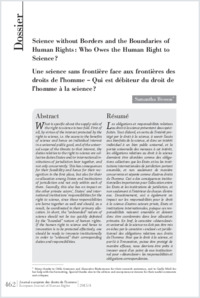Science without Borders and the Boundaries of Human Rights : Who Owes the Human Right to Science?
- Besson, Samantha University of Fribourg
-
2015
Published in:
- European Journal of Human Rights. - 2015, no. 4, p. 462-485
English
What is specific about the supply-side of the right to science is two-fold. First of all, by virtue of the interest protected by the right to science, i.e. the access to the benefits of science and hence an individual interest in a universal public good, and of the universal scope of the threats to that interest, the duties relative to the right to science are collective duties States and/or international institutions of jurisdiction bear together, and not only concurrently. This has consequences for their feasibility and hence for their recognition in the first place, but also for their co-allocation among States and institutions of jurisdiction and not only within each of them. Secondly, this also has an impact on the other private actors’, States’ and international institutions’ responsibilities for the right to science, since those responsibilities are borne together as well and should, as a result, be coordinated in their primary allocation. In short, the “unbounded” nature of science should not be too quickly defeated by the “bounded” nature of human rights. If the human right to science and hence to innovation is to be protected effectively, one should be ready to innovate institutionally in order to “unbound” their corresponding duties and responsibilities.
- Faculty
- Faculté de droit
- Department
- Département de droit international et droit commercial
- Language
-
- English
- Classification
- Law, jurisprudence
- License
-
License undefined
- Identifiers
-
- RERO DOC 257752
- Persistent URL
- https://folia.unifr.ch/unifr/documents/304601
Statistics
Document views: 326
File downloads:
- Texte intégral: 270
